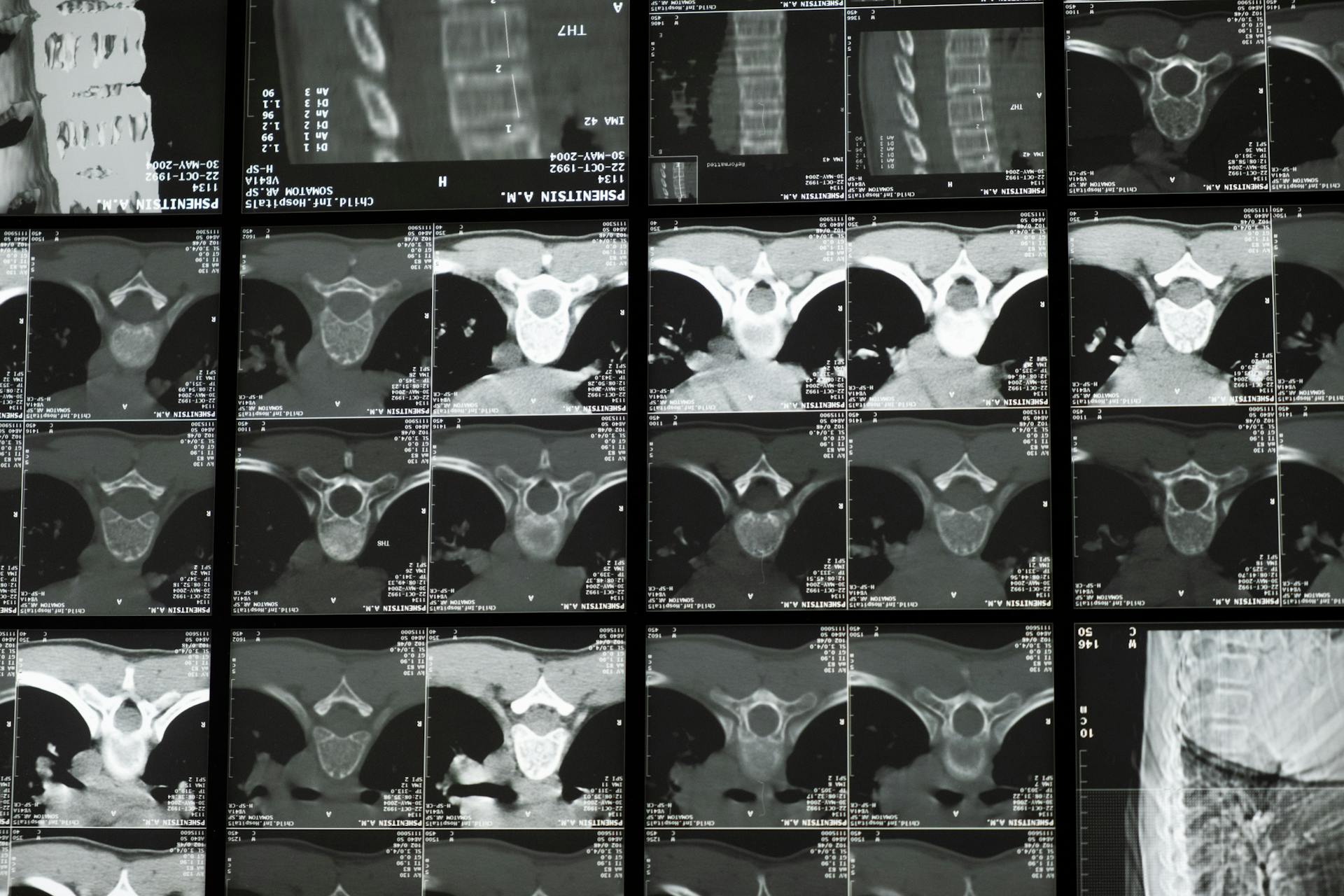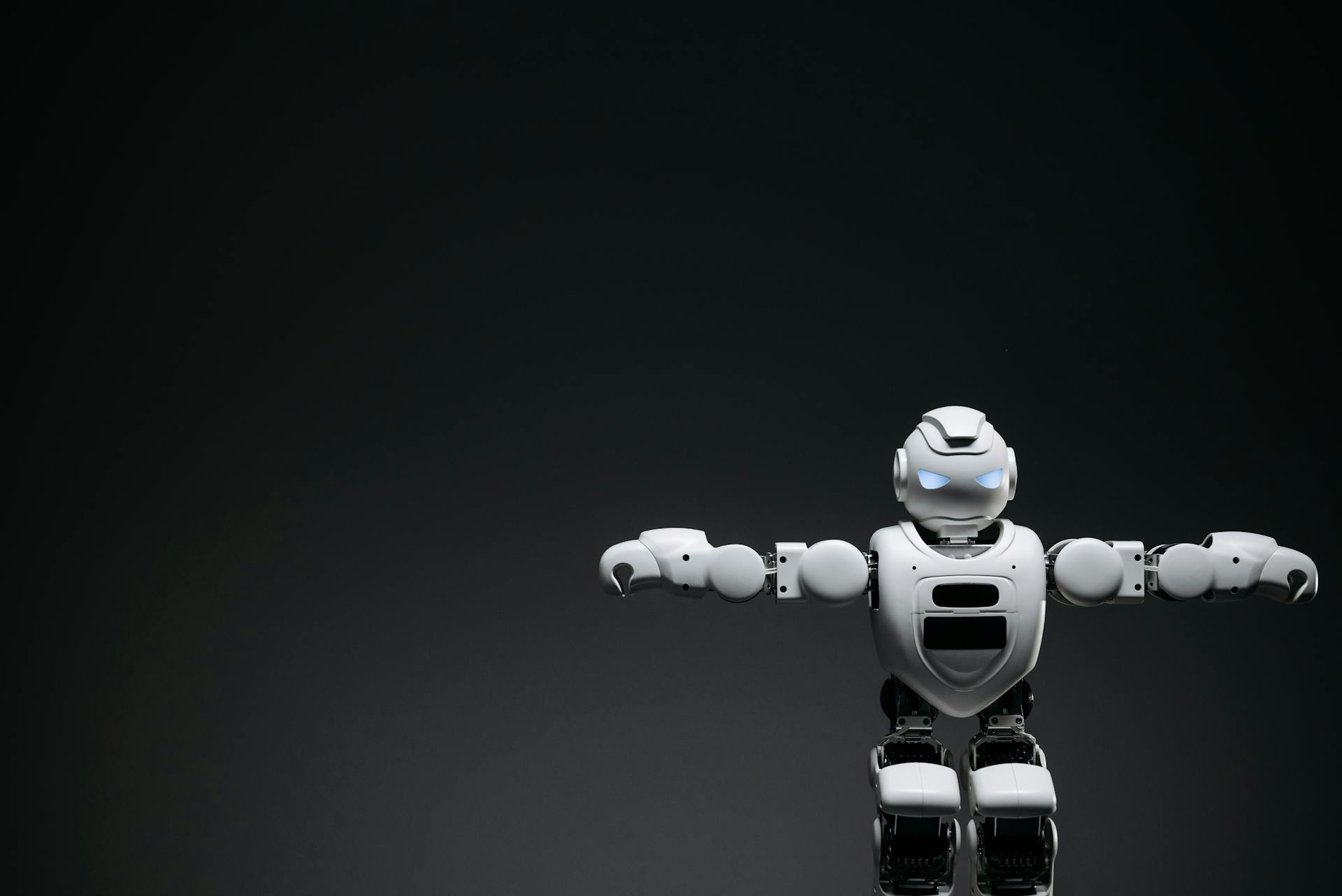
Artificial intelligence (AI) is transforming the healthcare industry in significant ways, with a focus on enhancing diagnostics, treatment, and patient experience.
AI-powered computer vision is being used to analyze medical images, such as X-rays and MRIs, to help doctors detect diseases like cancer and diabetic retinopathy more accurately and quickly.
According to a study, AI-assisted diagnosis can reduce the time it takes to identify breast cancer from 23 days to just 2 hours.
AI is also being used to develop personalized treatment plans for patients, taking into account their unique genetic profiles and medical histories.
The Current State
The current state of AI in healthcare is rapidly evolving and becoming increasingly normal. The presence of AI in the healthcare industry has gone from novel to normal, with applications ranging from medical imaging analysis to personalized treatment recommendations.
Healthcare facilities are increasingly experimenting with machine learning technologies and algorithms to assist with diagnosing diseases in medical images, including X-rays, MRIs, and CT scans. This is a significant shift, as AI tools are now being used to aid clinicians in making better, more accurate decisions around patient healthcare.
The adoption of AI in health tech has accelerated worldwide, with the global AI healthcare market expected to grow at a CAGR of 38.5% from 2024 to 2030. This surge in investment emphasizes the growing confidence among healthcare professionals in the AI industry and its potential to revolutionize healthcare delivery.
AI tools are even showing the capacity to outperform human experts in clinical reasoning, which is a significant breakthrough in the field.
The Challenges of
Data privacy and security are significant challenges that providers face when implementing AI into their workflows.
Collecting large amounts of personal health information can be a major concern, and AI systems must be handled correctly to avoid misuse.
Patient safety and accuracy are also crucial concerns, as AI systems must be trained to recognize patterns in medical data and provide accurate recommendations.
Data privacy is particularly important because AI systems collect sensitive patient information, which could be exploited if not handled correctly.
Integrating AI with existing IT systems can introduce additional complexity for medical providers, requiring a deep understanding of how existing technology works.
Gaining acceptance and trust from medical providers is critical for successful adoption of AI in healthcare, and transparency is essential for physicians to feel confident in the AI system's decisions.
Compliance with federal regulations is a must to ensure that AI systems are being used ethically and not putting patient safety at risk.
Physicians need to understand how the AI system is making decisions so they can be sure it's using valid, up-to-date medical research.
System Integration and Ethics
System integration and ethics are crucial aspects of implementing AI in healthcare. Many healthcare facilities still operate on outdated legacy systems that aren't designed to integrate with modern AI technologies.
Ensuring compatibility between new AI tools and existing systems can be a complex technical challenge. Upgrading these systems can be costly and time-consuming, making it a significant barrier to AI adoption.
Achieving seamless interoperability between various AI systems and healthcare platforms requires creating standardized protocols and data formats. This isn't a simple task, but it's essential for the effective use of AI in healthcare.
Transparency in AI decision-making processes is critical to maintain patient trust, particularly around consent and autonomy. Patients should be informed about how their data is used and have the option to consent or decline the use of AI in their care.
Clear guidelines and frameworks for accountability are necessary to address the issue of who is responsible for AI errors. This includes creating data governance, certification processes, accountability, and transparency standards.
Here's an interesting read: Generative Ai Use Cases in Healthcare
Data Security
Data security is a top priority in healthcare AI, with patient data including personal, financial, and medical information that must be protected from security breaches and unauthorized access.
The Health Insurance Portability and Accountability Act (HIPAA) and General Data Protection Regulation (GDPR) must be complied with, adding to the challenge of keeping patient data safe.
Cyberattacks on healthcare systems are increasing, with the OCR receiving reports of 720 data breaches of 500 or more patient records.
Protecting patient data requires a well-defined security process when turning EHR patient records into an ML dataset to ensure protected health information (PHI) is removed.
Data breaches can have devastating consequences, including the disruption of services and potential patient harm.
Ethical Considerations
In traditional healthcare practices, patients should be informed about how their data is used and have the option to consent or decline the use of AI in their care.
Transparency in the AI decision-making processes is critical to maintain patient trust. This means that patients should be able to understand how AI systems make decisions and what data is used to inform those decisions.
Clear guidelines and frameworks for accountability are necessary to address the issue of who is responsible when AI systems make errors. Typically, it's unclear whether the AI system, the developer, or the physician is accountable.
The use of AI in healthcare has raised several ethical questions, particularly around consent and autonomy. Patients' rights and dignity must be respected in the development and deployment of AI systems.
To ensure the responsible use of AI in healthcare, healthcare professionals and data analysts must continuously monitor and evaluate AI systems to detect and mitigate biases early on. This includes using diverse and representative datasets when training AI models.
Here's an interesting read: Safe Secure and Trustworthy Development and Use of Artificial Intelligence
System Integration
System integration is a crucial aspect of implementing AI in healthcare. Many healthcare facilities still operate on outdated legacy systems that aren't designed to integrate with modern AI technologies.
Upgrading these systems can be costly and time-consuming, and ensuring compatibility between new AI tools and existing systems is often a complex technical challenge.
Achieving seamless interoperability between various AI systems and healthcare platforms is critical. This requires creating standardized protocols and data formats, which isn't a simple task.
Healthcare professionals must work together to establish these protocols and formats, as it's essential for the effective use of AI in healthcare.
Future Developments
AI will play a larger role in forecasting patient volumes and healthcare needs with predictive models analyzing patient patterns and trends.
Predictive models will help healthcare providers prepare for future needs and make informed decisions. Advanced AI applications will also enable virtual health assistants to offer real-time health advice.
The integration of AI in healthcare will continue to grow, with AI technologies ensuring the safe and effective use of AI in healthcare. However, bias mitigation and data privacy will remain at the forefront of regulatory discussions.
Healthcare providers will partner more with technology companies to develop and deploy AI tools, increasing innovation and adoption in the industry. This collaboration will lead to more efficient use of resources and better patient outcomes.
AI may help promote sustainability in healthcare by optimizing resource use in healthcare facilities, reducing waste, and improving efficiency. This prediction aligns with broader trends towards more eco-friendly practices in the healthcare industry.
Additional reading: Artificial Intelligence in Automotive
The medical community is preparing for the integration of precision medicine and artificial intelligence, with experts like Eric Topol believing it will be the most significant transformation in medical history. However, caution is needed until solid evidence from real-world applications is obtained.
Deep learning AI can be used to detect diseases faster, provide personalized treatment plans, and automate certain processes like drug discovery or diagnostics. It also holds promise for improving patient outcomes, increasing safety, and reducing costs associated with healthcare delivery.
Quantum computing will accelerate drug discovery, analyze genetic data, and optimize treatment plans, while advanced robotics will automate mundane tasks and improve surgical precision. Sophisticated AI models can diagnose diseases, predict treatment responses, and identify risks.
Applications and Benefits
Artificial Intelligence in healthcare is transforming the way medical professionals diagnose and treat patients. By analyzing vast amounts of medical data, AI can identify patterns and predict treatment outcomes with remarkable accuracy.
One of the most significant benefits of AI in healthcare is its ability to diagnose diseases more accurately and at an earlier stage. For instance, AI algorithms can analyze medical images like X-rays and MRIs with greater speed and accuracy than human radiologists, often detecting diseases like cancer at earlier stages.
AI is also revolutionizing patient care management by providing 24/7 support and monitoring through AI-driven chatbots and virtual health assistants. These tools enhance patient engagement and adherence to treatment plans, leading to better health outcomes and reduced healthcare costs.
The integration of AI in healthcare has brought about a paradigm shift, making healthcare more efficient, accurate, and personalized. AI can automate mundane tasks like data entry, claims processing, and appointment scheduling, freeing up time for medical professionals to focus on patient care.
AI's ability to analyze large datasets has also led to the development of predictive analytics, enabling healthcare providers to offer proactive, preventative care. This predictive capability can identify potential health risks and enable healthcare providers to take preventive measures, ultimately leading to better patient outcomes and reduced healthcare costs.
The use of AI in healthcare has also led to the creation of customized treatment plans tailored to each patient's unique characteristics. By leveraging advanced algorithms and data analysis, AI enables healthcare professionals to identify patterns and predict treatment outcomes accurately, leading to more effective interventions and improved patient outcomes.
Here are some key applications of AI in healthcare:
- Improving medical diagnosis
- Speeding up drug discovery
- Transforming patient experience
- Managing healthcare data
- Performing robotic surgery
These applications are transforming the healthcare landscape, making it more efficient, accurate, and personalized. By leveraging AI's capabilities, healthcare professionals can provide better patient care, reduce healthcare costs, and improve health outcomes.
Efficiency and Cost Savings
Artificial intelligence is revolutionizing healthcare administration, streamlining mundane tasks and enhancing efficiency.
AI-powered systems can handle various administrative responsibilities, including scheduling appointments, processing medical bills, and optimizing resource allocation. This automation results in substantial cost reductions and improved healthcare delivery quality and efficiency.
AI-driven scheduling platforms leverage historical data and patient preferences to create optimized schedules, reducing wait times and maximizing satisfaction. Automated billing processes, facilitated by AI, minimize errors and improve cash flow for healthcare providers.
The benefits of AI applications in healthcare are substantial, including streamlined processes, reduced errors, optimized resource allocation, enhanced revenue cycle management, predictive analytics for cost containment, and improved supply chain management.
Here are some of the specific financial benefits of AI applications in healthcare:
- Streamlined Processes: AI automation reduces costs associated with manual processes.
- Reduced Errors: AI algorithms minimize human errors, improving patient safety and eliminating financial implications.
- Optimized Resource Allocation: AI analyzes data to direct resources where needed, leading to cost savings and better patient outcomes.
- Enhanced Revenue Cycle Management: AI automates tasks like insurance verification, accelerating the revenue cycle and improving cash flow.
- Predictive Analytics for Cost Containment: AI identifies high-risk patients and patterns, enabling proactive care and reducing costly interventions.
- Improved Supply Chain Management: AI optimizes the supply chain by identifying cost-saving opportunities and maintaining optimal stock levels.
By leveraging AI, healthcare providers can invest in new technologies, expand services, and enhance the quality of healthcare delivery.
Accessibility to Services
Accessibility to services is a crucial aspect of the future of artificial intelligence in healthcare. With AI-supported decision-making tools, healthcare providers can now offer more personalized care to patients, leading to improved patient outcomes.
These tools are being successfully implemented in various areas, including radiology, oncology, and cardiology. They provide real-time guidance by integrating with various data sources, aiding in time-sensitive decisions and reducing errors.
Healthcare providers can now act proactively by detecting patterns across vast populations, leading to personalized care that boosts overall health outcomes. This is made possible by AI's ability to analyze large amounts of data and provide insights that were previously unavailable.
The benefits of AI in healthcare are not limited to direct patient care. It also aids in research, population health management, and enhancing patient experience.
Telemedicine and Remote Care
AI-powered telemedicine is revolutionizing the way we receive medical care. By allowing patients to consult with healthcare providers remotely, it's making healthcare more accessible and convenient.
With AI-driven virtual assistants and chatbots, patients can receive medical advice and initial assessments from the comfort of their own homes. This is especially beneficial for those with busy schedules or living in remote areas.
AI can analyze data from wearable devices and sensors to monitor patient health remotely, enabling healthcare providers to intervene proactively and personalize treatment plans. This is a game-changer for managing chronic conditions and preventing complications.
AI also supports diagnosis and decision-making by analyzing medical images and EHRs to identify abnormalities and uncover patterns. This helps healthcare providers make more accurate diagnoses and develop effective treatment plans.
Here are some key benefits of AI-powered telemedicine and remote care:
- Enhanced accessibility and convenience
- Improved patient engagement and empowerment
- Personalized treatment plans and interventions
- Reduced costs and hospital visits
- Improved patient outcomes and quality of care
By leveraging AI in telemedicine and remote care, healthcare systems can enhance the quality of care, reduce costs, and improve patient outcomes. This technology is transforming healthcare delivery by making it more accessible, proactive, and personalized.
Medical Research and Development
Medical research and development is an area where AI is making a significant impact. AI can aid in the development of new drug therapies by providing access to new biology, improving or novel chemistry, improving success rates, and quicker and less expensive discovery processes.
AI is being used to develop vaccines for diseases like Covid-19, and it's also being used to create more effective immunotherapy therapies for cancer. These therapies use the body's immune system to fight back against malignancies, but current immunotherapies are only effective in a small percentage of patients.
AI has the potential to improve the understanding of immunotherapy by harnessing vast pools of data and potentially uncovering new pathways to developing treatments based on a patient's genetic makeup. This could lead to more effective treatments for cancer and other diseases.
AI is also being used to analyze vast amounts of data in medical image diagnostics, improving diagnosis accuracy and reducing workload for healthcare professionals. By automating routine tasks, AI frees up radiologists' time for more intricate aspects of patient care.
Intriguing read: New Artificial Intelligence Program
Here are some ways AI is contributing to drug discovery:
- Data Analysis: AI algorithms uncover hidden patterns in large datasets, providing deeper insights into disease mechanisms and potential treatments.
- Virtual Screening: AI-powered tools rapidly assess compound libraries, reducing the time and costs associated with traditional screening methods.
- Drug Design: AI algorithms design and optimize novel drug molecules with improved properties based on specific criteria.
- Clinical Trial Optimization: AI identifies suitable patient populations, designs adaptive protocols, and predicts patient outcomes, leading to more efficient and informative trials.
- Safety and Efficacy Evaluation: AI algorithms analyze clinical trial data to identify safety and efficacy signals early, ensuring patient safety and effective drug development.
- Predictive Modeling: AI models predict drug efficacy and side effects based on structural and biological properties, guiding researchers in selecting promising compounds for further development.
Enhanced Diagnostics
The integration of AI in medical image diagnostics has revolutionized healthcare, allowing AI algorithms to analyze vast data, identify subtle abnormalities, and provide real-time decision support.
This improvement in diagnosis accuracy and patient outcomes is made possible by AI's ability to automate routine tasks, freeing up radiologists' time for more intricate aspects of patient care.
AI-assisted diagnostics have led to early disease detection, enabling timely interventions and improved prognoses.
According to statistics, medication errors result in around 9,000 deaths per year and hundreds of thousands of adverse reactions or medication complications, with a resulting cost of $40 billion.
Employing AI to analyze data related to medical treatments, medications, side effects, and more can reduce the chances of these medication errors.
AI can help doctors improve their success rate when diagnosing patients, with studies showing that between 10-15% of diagnostic errors occur in the form of missed, incorrect, or delayed diagnoses.
AI models can help radiologists interpret diagnostic images, find anomalies and patterns that might otherwise be missed, and result in a more accurate and timely diagnosis.
Medicine Discovery and Development
AI can help discover and develop medicine in various ways, including access to new biology, improved or novel chemistry, improved success rates, and quicker and less expensive discovery processes.
The integration of AI into drug discovery is transforming the pharmaceutical industry, making the process faster, more efficient, and more precise.
AI algorithms can uncover hidden patterns in large datasets, providing deeper insights into disease mechanisms and potential treatments.
AI-powered tools can rapidly assess compound libraries, reducing the time and costs associated with traditional screening methods.
AI can design and optimize novel drug molecules with improved properties based on specific criteria, and predict drug efficacy and side effects based on structural and biological properties.
The use of AI in medicine development has already led to breakthroughs in treating diseases such as Ebola and cancer, with AI analysis leading to the development of treatments in a matter of days or months, instead of years.
Here are some key ways AI is aiding in medicine discovery and development:
- Data Analysis: AI algorithms uncover hidden patterns in large datasets.
- Virtual Screening: AI-powered tools rapidly assess compound libraries.
- Drug Design: AI algorithms design and optimize novel drug molecules.
- Predictive Modeling: AI models predict drug efficacy and side effects.
AI is also being used to create personalized treatment plans tailored to each patient's unique characteristics, leading to more effective outcomes and cost savings.
Companies and Technologies
IBM's Watson for Genomics is a prime example of AI in healthcare, using machine learning to analyze genomic data and identify potential treatments for patients with genetic disorders. This technology has shown significant promise in improving patient outcomes.
Google's DeepMind Health is another notable example, using AI to analyze medical images and diagnose conditions such as eye diseases. This technology has the potential to revolutionize the way doctors diagnose and treat patients.
These companies are just a few examples of the many organizations working to integrate AI into healthcare, with the goal of improving patient care and outcomes.
Companies Using
Companies using AI in healthcare are leading the way for innovation. EliseAI and Cohere Health are two companies that are making significant strides in this area.
One of the notable companies using AI in healthcare is Pfizer. They're using AI to improve various aspects of the healthcare industry.
Butterfly Network and Novo Nordisk are also using AI in healthcare, joining the ranks of these innovative companies.
Devices
AI-powered medical devices can continuously monitor a patient's physical condition and alert patients and doctors when issues are detected.
These devices are especially useful in critical care settings, like intensive care units, where patients need 24/7 monitoring for life-threatening conditions.
Smart medical devices and machines can alert patients and doctors to potential issues before they become serious problems.
This technology has the potential to benefit doctors and patients in a facility setting by providing real-time monitoring and alerts.
Future of AI in Healthcare
The future of AI in healthcare is incredibly promising. AI will continue to play a larger role in forecasting patient volumes and healthcare needs with predictive models playing a major role in analyzing patient patterns and trends.
Advanced AI applications will allow for the use of virtual health assistants that offer real-time health advice. These virtual assistants will become more sophisticated and widespread, making healthcare more accessible and convenient.
Regulatory and ethical advancements will be crucial in ensuring the safe and effective use of AI in healthcare. Government bodies will develop frameworks to address issues like bias mitigation and data privacy.
Collaboration and partnership between healthcare providers and technology companies will drive innovation and adoption of AI in healthcare. This will lead to the development and deployment of new AI tools and technologies.
AI has the potential to promote sustainability in healthcare by optimizing resource use in healthcare facilities. This will help reduce waste and improve efficiency, aligning with broader trends towards more eco-friendly practices in the healthcare industry.
The integration of precision medicine and AI will revolutionize healthcare. AI adoption in healthcare is crucial and imminent, but the medical community must approach it with caution, as it will be the most significant transformation in medical history.
AI can help detect diseases faster, provide personalized treatment plans, and automate certain processes like drug discovery or diagnostics. It also holds promise for improving patient outcomes, increasing safety, and reducing costs associated with healthcare delivery.
The primary obstacle for AI in healthcare isn't its capability to be effective, but rather its integration into everyday clinical practice. Medical professionals might shift towards roles that necessitate distinctly human skills, particularly those involving advanced cognitive functions.
Sources
- https://www.rxnt.com/whats-the-future-of-ai-in-healthcare-technology/
- https://www.solulab.com/future-of-ai-in-healthcare/
- https://sidebench.com/ai-healthcare-future-holds/
- https://builtin.com/artificial-intelligence/artificial-intelligence-healthcare
- https://www.foreseemed.com/artificial-intelligence-in-healthcare
Featured Images: pexels.com


